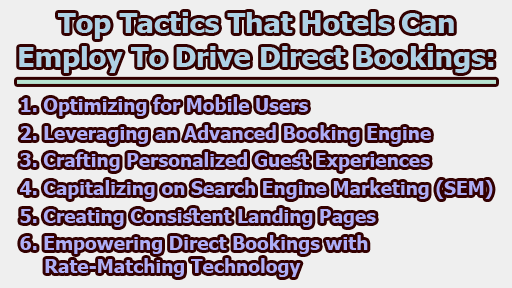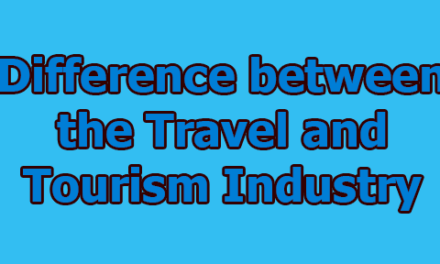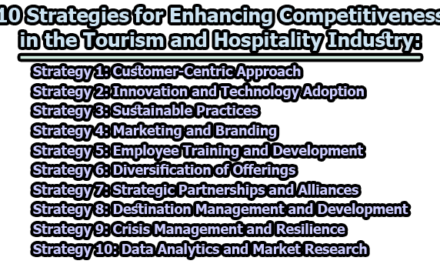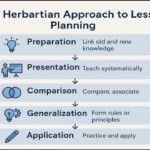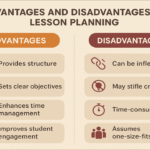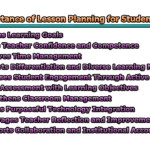Top Tactics That Hotels Can Employ To Drive Direct Bookings:
In the rapidly evolving landscape of the hospitality industry, hotels are continually seeking innovative strategies to increase revenue and enhance guest experiences. One of the most pressing challenges they face is the diminishing number of direct bookings, which not only leads to revenue loss due to high commissions charged by Online Travel Agencies (OTAs) but also limits hotels’ ability to create tailored guest experiences. However, with the right tools and tactics, hotels can overcome these challenges and encourage guests to make direct bookings through their official websites. This article delves into the top tactics that hotels can employ to drive direct bookings, empowering them to establish a stronger foothold in today’s competitive market.
1. Optimizing for Mobile Users: The Digital Gateway to Direct Bookings: In the present day, mobile devices have become indispensable companions for travelers throughout their journey. The majority of travelers utilize smartphones and tablets to research, plan, and book accommodations. Therefore, a responsive and user-friendly mobile website is not a luxury, but a necessity. Hotels must ensure that their websites are seamlessly optimized for mobile users, offering an intuitive browsing and booking experience. A subpar mobile interface can deter potential guests from completing their bookings, undermining the hotel’s efforts to encourage direct reservations.
2. Leveraging an Advanced Booking Engine: Where Conversion Meets Convenience: A pivotal aspect of driving direct bookings is the efficacy of a hotel’s booking engine. A basic booking engine might fall short in the current competitive landscape. Hotels should transition to an integrated booking engine replete with a range of features aimed at converting casual browsers into confirmed bookings. Dynamic pricing rules, retargeting capabilities, and urgency messaging are crucial elements of an effective booking engine. These features not only prompt guests to make direct bookings but also create a sense of urgency and value, incentivizing quicker decisions.
3. Crafting Personalized Guest Experiences: Beyond “Book Now”: In the era of heightened individual preferences, a one-size-fits-all approach is no longer sufficient to cater to the diverse needs of modern travelers. Hotels can distinguish themselves by personalizing the website experience for each guest. Advanced Content Management Systems (CMS) empower hotels to leverage user data and curate unique journeys for every visitor. Tailored blog content, intent-driven offers, and personalized perks are among the myriad ways hotels can provide a bespoke experience. By delivering pertinent content and incentives, hotels can entice guests to opt for direct bookings, confident in the value they receive.
4. Capitalizing on Search Engine Marketing (SEM): Guiding the Guest Journey: The guest journey often commences with a simple online search. Hotels can capitalize on this by implementing strategic SEM campaigns. By bidding on targeted keywords related to their brand, location, and unique selling points, hotels can channel traffic directly to their websites. Prioritizing key terms, especially exact matches, ensures that a hotel’s advertisements feature prominently in search results. This approach not only enhances visibility but also guides potential guests to the hotel’s official website, nurturing the prospect of direct bookings.
5. Creating Consistent Landing Pages: Bridging the Gap: While steering traffic to the hotel website is pivotal, maintaining a cohesive and engaging user experience upon arrival is equally vital. Crafting relevant and visually appealing landing pages that align with the messaging of advertisements is paramount. Whether the source is SEM campaigns or paid social media posts, the landing page should seamlessly reflect the content and tone of the ad. A seamless transition from ad to landing page reduces bounce rates and encourages users to delve deeper, culminating in higher conversion rates.
6. Empowering Direct Bookings with Rate-Matching Technology: Competing with the ever-fluctuating rates offered by OTAs can be a daunting endeavor. However, hotels can gain a competitive edge by integrating rate-matching technology. Cutting-edge solutions like Cendyn’s Rate Match seamlessly integrate with booking engines to dynamically adjust rates in real-time. This ensures that the rates offered on the hotel’s website align with or surpass OTA prices. This technology not only heightens the value proposition for direct bookings but also empowers guests with transparency and confidence in their decision-making.
To sum up, in the ever-shifting landscape of hospitality, the pursuit of direct bookings emerges as a cornerstone strategy, reshaping the industry’s trajectory. As we traverse this journey, we unearth a symphony of tactics that harmonize seamlessly to drive guests toward a direct booking paradigm. From optimizing mobile experiences and integrating advanced booking engines to crafting personalized guest journeys and mastering the art of search engine marketing, hotels wield a formidable arsenal of strategies. The creation of consistent landing pages and the empowerment of rate-matching technology further bolster this endeavor. In embracing these tactics, hotels not only reclaim control over their revenue streams but also cultivate intimate guest relationships, fortified by tailored experiences. As the hospitality industry propels forward into an era defined by innovation, those who steer the course of direct bookings today will chart a transformative path that reverberates across the landscape of tomorrow’s hospitality landscape.
Frequently Asked Questions (FAQs):
Why are direct bookings important for hotels?
Direct bookings play a pivotal role in the success of hotels for several reasons. Firstly, they allow hotels to avoid the high commission fees imposed by Online Travel Agencies (OTAs), thus maximizing revenue. Secondly, direct bookings provide hotels with the opportunity to gather valuable guest data, enabling them to create personalized experiences and build guest loyalty. Lastly, direct bookings enable hotels to maintain control over the entire booking process, enhancing the overall guest experience.
How can a mobile-friendly website influence direct bookings?
In the digital age, mobile devices are the primary means through which travelers research and book accommodations. A mobile-friendly website ensures that potential guests can seamlessly navigate and make reservations through their smartphones or tablets. If a hotel’s website isn’t optimized for mobile, it can lead to a frustrating user experience and potential guests may abandon the booking process, opting for a competitor that offers a more user-friendly mobile interface.
What is an integrated booking engine, and why is it important?
An integrated booking engine is a comprehensive tool integrated into a hotel’s website that allows guests to browse room options, check availability, and make reservations directly. It is crucial because it enhances the guest experience by providing real-time information and simplifying the booking process. With features like dynamic pricing rules, retargeting capabilities, and urgency messaging, an advanced booking engine can effectively convert website visitors into confirmed bookings.
How can hotels personalize the guest experience on their websites?
Hotels can personalize the guest experience by tailoring their website content and offers to match individual guest preferences. Utilizing an advanced Content Management System (CMS), hotels can analyze user data to create unique pathways for each guest. This can involve adapting blog content to match interests, providing intent-driven offers, and offering personalized perks based on past behavior or preferences.
What role do SEM campaigns play in driving direct bookings?
Search Engine Marketing (SEM) campaigns are instrumental in driving traffic directly to a hotel’s website. By bidding on relevant keywords, hotels can ensure their ads appear prominently in search results, guiding potential guests to their official website rather than OTA platforms. SEM campaigns are especially effective for capturing guests during the initial stages of their travel planning, funneling them toward direct bookings.
How do landing pages impact the user experience and conversions?
Landing pages are crucial in maintaining a consistent and engaging user experience after users click on ads or links. When landing pages align with the content and tone of the originating ads, visitors experience a seamless transition, reducing bounce rates and increasing the likelihood of conversions. These dedicated pages provide visitors with the information and incentives they need to make a direct booking, improving the overall effectiveness of marketing campaigns.
What is rate-matching technology, and how does it benefit hotels?
Rate-matching technology is a dynamic solution that ensures the rates offered on a hotel’s website align with or even surpass OTA prices in real time. This technology empowers hotels to provide guests with competitive rates, instilling confidence that they are receiving the best deal when booking directly. By bridging the rate gap between OTAs and the hotel’s website, rate-matching technology encourages guests to choose direct bookings.
How can hotels measure the success of their direct booking strategies?
Hotels can measure the success of their direct booking strategies through key performance indicators (KPIs) such as the percentage of direct bookings, website traffic, bounce rates, and conversion rates. Analyzing these metrics helps hotels understand the impact of their tactics and make informed adjustments as needed to optimize their direct booking efforts.
What does the future hold for direct bookings in the hospitality industry?
The future of direct bookings is promising, with hotels increasingly recognizing their value and investing in strategies to encourage them. As technology continues to evolve, hotels will have even more tools at their disposal to enhance the guest experience and drive direct bookings. Personalization, seamless mobile experiences, and innovative booking technologies will continue to be essential elements in the quest to attract guests to book directly with hotels, shaping the industry’s trajectory for years to come.

Assistant Teacher at Zinzira Pir Mohammad Pilot School and College

